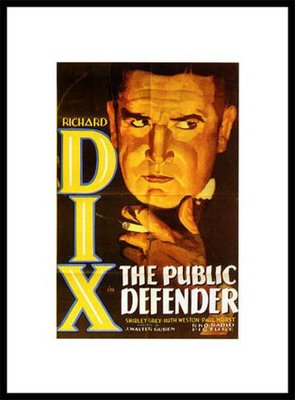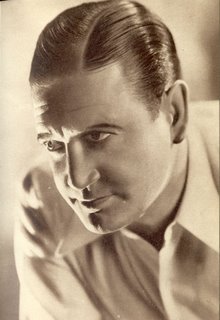 The Public Defender (1931)
The Public Defender (1931)
Director: J. Walter Ruben
A paradox exists in the world of the film buff. Buffs consider cinema an art form that transcends mere entertainment or box office value. Yet, buffs are constantly looking for corners of film making that few people would give a second look--and those corners often contain the throwaway entertainments of yesteryear. To the average filmgoer, a bad film is just a bad film. To a film buff, a bad film might have other rewards in what it reveals about tastes, technological capabilities, social norms, and fashions and decor of a particular period. A bad film might also give a collector of a particular star's filmography a missing link or insight into their favorite performer. It is with these thoughts in mind that I review a bad film that I'm very happy I saw--The Public Defender.
The Public Defender--not really bad, but rather mediocre--is a fascinating film to me for several reasons. The year it was made was interesting for the film industry, in general, and for its star Richard Dix, in particular. In 1931, Dix not only made this low-budget quickie, but also starred in the acclaimed Western, Cimarron. He received a Best Actor Oscar nomination for his performance, and Cimarron won a slew of Oscars, including Best Picture, and stamped cinema history with one of its most famous scenes--the thrilling stampede of would-be landowners during the Oklahoma land rush of 1889. The film also is an early talkie, and witnessing the challenges of this new technology has merit. In addition, the story of The Public Defender could have been ripped off for a hero who has been fodder for many an entertainment up to the current day--Batman. Finally, Richard Dix is an actor who has been a compelling presence to me ever since I saw him in a superb silent film about the plight of Native American veterans of World War I, The Vanishing American (1925).
The Public Defender begins in the board room of a bank, where board member Eugene Gerry (Emmett King) is being arrested for misappropriation of funds. Gerry swears his innocence, but his colleagues turn a deaf ear to his pleas. In fact, they are the real thieves and are using him as the fall guy. A short time later, one of the conspirators is robbed of some business papers. The only clue to his assailant is a card left at the scene that says "The Reckoner."
The other conspirators are at a country club, talking in private, when rich playboy Pike Winslow (Dix) enters the club following a couple of months of traveling after quitting his job to live off his large inheritance. He is there to dine with Barbara Gerry (Shirley Grey) and her disapproving Aunt Matilda (Nella Walker). Gerry laments that their home and its contents will be sold to pay restitution to the bank. Winslow offers the use of an apartment of a friend who will be going abroad and is looking for a suitable tenant to sublet it; of course, the apartment actual is his. Winslow also attends the estate auction and secretly buys some of the Gerry treasures to return to the family. He is sure Eugene Gerry is innocent and has been about trying to prove it--as The Reckoner. His date with Ms. Gerry is a cover to allow him to snoop around the bank partners.
The parallel with Bruce Wayne/Batman (which did not appear until 1939) is unmistakable. Winslow even has an Alfred-like "Professor" played by Boris Karloff and a strong-arm "Doc" (Paul Hurst) who forms a rough parallel to Robin. Winslow constantly pesters the police inspector 'Mal' O'Neil (Alan Roscoe) for a deputy's badge, suggesting the alliance Batman would form with Commissioner Gordon. He also never steals anything of monetary value; he is only after evidence of the crime and frame-up.
Within its low budget, The Public Defender manages a few scenes to suggest the opulent surroundings of its main characters, particularly the auction inside the Gerry home. Most of the sets, however, are very plain, and the costumes might have come from the actors' own closets. When characters walk on wooden floors, every footfall is loud and clear. Improvements in microphone equipment and placing were works in progress. Characters appear and disappear with a single line of explanation, and many actions happen only to set up a climactic scene. Even disapproving Aunt Matilda has a change of heart toward Winslow that just happens. The acting is barely workmanlike from most of the cast.  Even Dix seems a bit wooden. His is a body and face made more for the silent screen. His voice has a strange, muffled quality to it I first noted from my viewing of him in the RKO/Val Lewton production The Ghost Ship (1943). Yet he went on to a long career at RKO and beyond, winning a new and loyal audience as the star of seven movies based on the mystery radio series "The Whistler." Indeed, The Public Defender has a serial feel, and serials were an important staple in the Hollywood line-up that persists today on television shows such as 24 and in movie series like Star Wars. While I can't call it a good movie, The Public Defender moves briskly and entertains, a tribute to what the movie factory could produce within its small budgets and tight shooting schedules. Yeoman directors like J. Walter Ruben aren't auteurs, but they are professionals who could teach modern film makers a trick or two.
Even Dix seems a bit wooden. His is a body and face made more for the silent screen. His voice has a strange, muffled quality to it I first noted from my viewing of him in the RKO/Val Lewton production The Ghost Ship (1943). Yet he went on to a long career at RKO and beyond, winning a new and loyal audience as the star of seven movies based on the mystery radio series "The Whistler." Indeed, The Public Defender has a serial feel, and serials were an important staple in the Hollywood line-up that persists today on television shows such as 24 and in movie series like Star Wars. While I can't call it a good movie, The Public Defender moves briskly and entertains, a tribute to what the movie factory could produce within its small budgets and tight shooting schedules. Yeoman directors like J. Walter Ruben aren't auteurs, but they are professionals who could teach modern film makers a trick or two.
In reviewing this film, I'm violating a rule I set for Ferdy on Films not to write about films that are not available in home viewing formats. It is only because Turner Classic Movies had a Richard Dix film festival that I got a chance to see it. Still, I think that a discussion of The Public Defender is instructive to provide a way to "read" films for more than their mere entertainment value. Keep your eye on TCM listings for future showings and try it yourself. You might just like it. l


4 Comments:
At 4:59 PM, Anonymous said…
Anonymous said…
Marilyn:
I apologize for using this comment space, but I didnt know how to get in touch with you. I just read a wonderful piece you did a while back on The Exiles. I knew Kent when I was a teenager, long story, and he was amazing. I was almost ina film of his. And for years I have been trying to track down the circumstances of his death.
You haved a great site.
Do you know?
Steve Gorelick
sgorelick@gc.cuny.edu
At 5:30 PM, Marilyn said…
Marilyn said…
Welcome to the site, and I'm glad you liked my review of "The Exiles" (http://www.brightlightsfilm.com/47/exiles.htm).
His was a great loss to film, but I know nothing more about his life or death than I learned in Thom Anderson's Los Angeles Plays Itself. Oddly, I was just thinking of that film today as I watched D.O.A.. One of Los Angeles' favorite locations, the Bradbury Building, as described in Anderson's film was in that classic noir.
At 8:30 PM, Anonymous said…
Anonymous said…
Love the poster--thanks for putting it up on the site!
At 6:55 AM, movies said…
movies said…
Fantastic reviews ! This is a great early pic from RKO and one of the best! Picture the team of Richard Dix, Paul Hurst, and Boris Karloff as good guys? The direction is SUPERB !
Post a Comment
<< Home